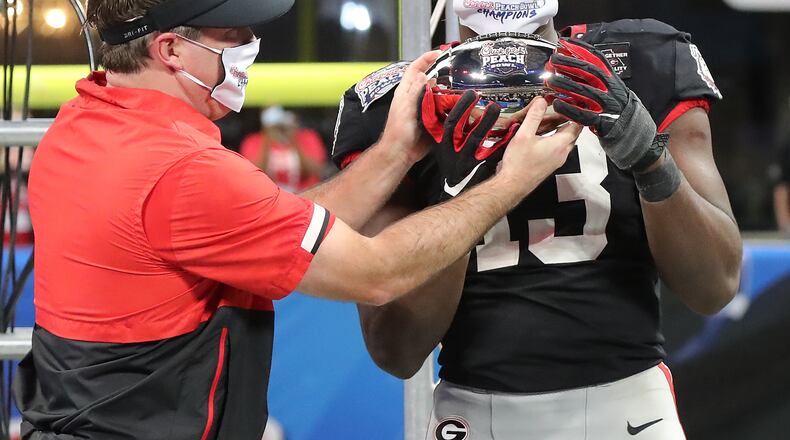ATHENS – Because of the state of Georgia’s opaque public-information laws for college athletics, it’s impossible to get a real-time picture of the impact COVID-19 has made on UGA’s football program or its overall athletic department. But even well after the fact, it is clear that it felt an impact.
According to data provided this week, 132 days after it was requested, Georgia football players had 29 positive tests for COVID-19 from the time they were required to report to campus June 1 until the week of the season-opening game against Arkansas on Sept. 26. Another 20 players were required to quarantine because of exposures over the same period of time.
In all, 580 athletes – 130 of them football players -- were subjected to regular tests for the virus during that span. With a total of 73 positive tests and 66 athletes quarantined, 24 percent of the athletes were affected by the virus.
UGA on Wednesday turned over COVID-19 numbers that the Atlanta Journal-Constitution requested right before Georgia’s football team embarked on a delayed and reduced schedule of SEC games. In a response in the fall to a previous request made in the summer, UGA said seven football players tested positive when they reported to campus for voluntary workouts June 1.
The university is permitted such long delays because of an obscure Georgia law, pushed through the state house in the 11th hour of its 2017 spring assembly. It gives state athletic departments 90 business days to respond to requests for public information, a right protected under the Freedom of Information Act.
With weekends and holidays added in, UGA released the athletic department’s most recent COVID-19 numbers 4½ months after they were requested Sept. 17.
In its report, Georgia does not identify any of the individuals who were infected. However, it’s well-known that the Bulldogs were one of the first college athletic departments to have an employee befallen by the virus.
Jeremy Klawsky, a 32-year-old football videographer, was diagnosed with COVID-19 in early March. He spent six weeks in an Athens hospital before he was released to the applause of dozens of UGA coaches, administrators and staffers, who came to celebrate Klawsky’s discharge.
By all accounts, Klawsky was the only member of the UGA Athletic Association at large to be hospitalized because of COVID-19. It’s speculated that his early interaction with the virus better prepared Georgia for navigating it the rest of the year.
“It personalized it for us,” said Greg McGarity, athletic director at the time. “It was so early when he was admitted (March 2). COVID was just kind of beginning; people were just kind of finding out about it.”
This past season, the Bulldogs were one of only four SEC football programs not to encounter a major outbreak within the team. Sports medicine director Ron Courson, who was appointed to the SEC’s “return to activity and medical guidance task force,” led the way to organizing a plan that would reduce Georgia athletes and staff from contact and exposure.
UGA adjusted doorways so that all access in and out of the Butts-Mehre athletic complex was one way. Summer strength-and-conditioning work was divided into smaller groups that entered and exited facilities at staggered times. Position-group meetings were conducted in either the expansive weight room or the indoor practice facility rather than in the respective, designated rooms.
During the season, the Bulldogs’ players were administered PCR tests three times a week, as well as all coaches and any members of the traveling party. The same is done for men’s and women’s basketball players and soccer players. Other sports, such as cross country, might undergo tests just once a week.
“I think we’ve been very fortunate here, but I also think that’s a credit to everybody involved, including our custodians,” Courson said. “Our building-services people have done an awesome job. They’re our frontline defense for infection control and put themselves at risk, too.”
All that precaution surely came with great costs. However, in response to the AJC’s requests for financial details on COVID-testing and other related expenses, UGA claims it does not possess any such records.
“The UGA Athletic Association reports that the COVID testing and billing processes are conducted by Piedmont Athens Regional Medical Center,” according to a university open-records representative. “Therefore, there are no documents responsive to your request to disclose.”
That might be because most of the test-handling occurred outside Georgia’s purview. Once the SEC football season began in late September, all testing was switched to being managed through the SEC via a third-party contractor. That was both to control costs and to ensure fairness and equitability as the teams embarked on weekly competition.
No one knows yet what the final price tag will be. The SEC is keeping an accounting of the costs and will divide the expense among the 14 schools at the time of league’s payouts in late May. Conservative estimates have it at $2 million per institution, though the real cost probably will be much higher.
Regardless, Georgia’s budget shortfall because of canceled events last spring and limited-seating and ticket sales for football and basketball is expected to approach $50 million.
UGA ATHLETICS VS. COVID-19
- 130 -- Number of football players tested since June 1-Sept. 17, 2020.
- 29 -- Number of positive tests June 1- Sept. 17, 2020.
- 20 -- Number of football players quarantined because of exposure June 1-Sept. 17.
- 580 -- Number of all UGA athletes tested since July 24, 2020 (450 in Olympic sports).
- 66 -- Number of all UGA athletes quarantined since July 24, 2020.
About the Author
Keep Reading
The Latest
Featured


